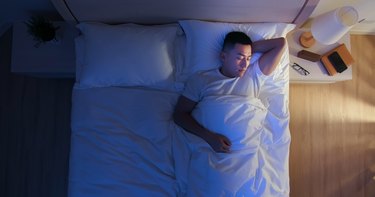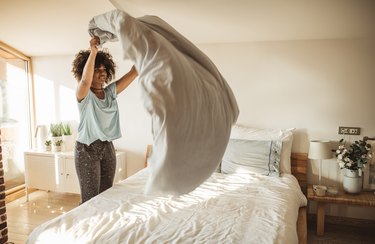
Vivid dreams don't always have a clear culprit. But sometimes those weirdly realistic (or just plain scary) scenarios your brain cooks up while you're sleeping can be traced back to something that's going on during the day.
Vivid dreams are often stranger or more lifelike than the dreams you typically have. In some cases, they can be straight-up nightmares. But no matter the theme or the feeling they provoke, they all have one thing in common: They're intense, and they tend to stick with you. (They might raise your heart rate, too.)
Video of the Day
Sometimes vivid dreams can be the result of stressful situations that happen when you're awake, says Arlington-Virginia-based sleep specialist Angela Holliday-Bell, MD. But other factors can affect the quality of your dreams too.
These are some of the most powerful influencers, plus what you can do if you want to make your dreams a little less memorable.
1. You're Sleep-Deprived
Running short on shut-eye can up the intensity of your dreams. (Not to mention cause a host of other problems.) The same goes for when your sleep gets interrupted or if you're dealing with changes to your sleep schedule, per the Mayo Clinic.
The vivid dreams are your brain's way of making up for lost sleep, which it does during the REM stage of sleep, says Dr. Holliday-Bell.
"Since REM is the sleep stage in which most dreaming occurs, it's likely that an individual has more vivid dreams after a period of sleep deprivation due to the increase in the amount of REM sleep they are getting," she explains.
2. You've Been Bingeing on Scary Shows Before Bed
Sure, you know those flesh-eating zombies aren't real. But watching or reading something scary can still trigger feelings of anxiety or stress, which can spill over into your dreams.
"It's believed by some that the brain processes emotions such as stress and anxiety during sleep, and the way this manifests is through your dreams, making them more vivid," Dr. Holliday-Bell says.
3. You Had a Nightcap (or Two)
You probably won't remember weird dreams — or any dreams at all — after an evening of imbibing. Alcohol actually disrupts your sleep, so you spend less of your snooze time in the dream-heavy REM stage, according to the Cleveland Clinic.
But you might notice your dreams intensify the next night, Dr. Holliday-Bell notes.
"Because of the poor sleep and decrease in REM the previous night, your body will try to make up for it the next night by increasing your amount of REM sleep," she explains.
4. You're Stressed Out
It can be harder to fall asleep when you're stressed, which can cause you to become sleep-deprived and lead to weirder or more intense dreams when you finally do nod off.
Stress can also cause you to wake up more throughout the night, Dr. Holliday-Bell says.
"This could mean waking during a REM stage, which increases the chance that an individual would remember the dream," she explains.
5. You're Pregnant or Recently Gave Birth
Many people notice their dreams become wilder or more realistic when they're pregnant. The reason, like so many pregnancy side effects, has to due with shifting hormones, according to a landmark September 2007 study in Sleep.
For the same reason, you might experience more vivid dreams before your period.
The phenomenon can continue on during the early postpartum days as your hormones continue swinging and you begin to deal with another dream amplifier: Sleep deprivation.
6. You're Taking a New Medication
Some antidepressants, blood pressure drugs, beta blockers and drugs used to treat Parkinson's disease and smoking cessation seem to send dreams into nightmare territory, per the Mayo Clinic.
The side effect hasn't been well studied, but it's thought that brain neurotransmitters affected by the medications are the same neurotransmitters that play a role in dream or nightmare imagery, Dr. Holliday-Bell says.
7. You Have Narcolepsy
Longer, more complex and more negative dreams are a common side effect of narcolepsy, the chronic sleep disorder marked by daytime drowsiness and sudden attacks of sleep, according to a May 2015 review in Sleep.
That's due to the fact that narcolepsy tends to cause a person to enter and exit sleep during the REM stage, Dr. Holliday-Bell says. So they're more prone to having vivid dreams — and remembering them upon waking.
Are Vivid Dreams Something to Worry About?
Though they can sometimes be unsettling, intense dreams or nightmares aren't usually a sign of a health issue.
"There's not a lot of research regarding the meaning of dreams, but we think it's our brain's way of processing emotions from the day and should generally not be of any concern," Dr. Holliday-Bell says.
But vivid dreams can be problematic if they're interfering with your ability to function during the day or fall asleep at night, according to the Mayo Clinic.
If you regularly can't focus at work or school because you can't stop thinking about your dreams or you're scared to go to bed because you worry you'll have nightmares, let your doctor know. You could have an underlying condition that may need to be addressed.
How to Stop Vivid Dreams
There's no surefire way to control your brain's overnight activity and dictate your dreams. But addressing possible risk factors tied to vivid dreams might make them less likely to occur.
Dr. Holliday-Bell recommends the following:
- Prioritize healthy sleep habits. You're less prone to intense dreams when you aren't sleep-deprived. Make it a point to get seven to nine hours of sleep each night, limit your use of electronic devices before bed and put together a bedtime routine that helps you relax.
- Steer clear of alcohol before bed. Booze can have a negative effect on sleep quality, which can translate to more vivid dreams.
- Keep nighttime content calm. If you opt to watch TV or read before bed, choose content that won't stress or scare you.
Is this an emergency? If you are experiencing serious medical symptoms, please see the National Library of Medicine’s list of signs you need emergency medical attention or call 911.


